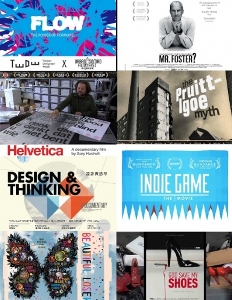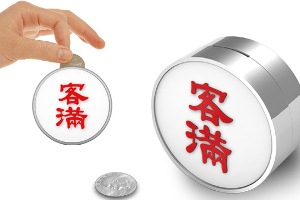Flow with design energy: 2012 Taiwan Designers' Week
The main theme of Designers' Week this year is "Flow ─ The Power of Forward," which means a continuous flow of the never-ending creativity of Taiwanese designers. Ten different "theme zones" are strung together by the word "flow:" Flow in Phenomenon, Flow in Memory, Flow in Environment and Flow in Methodology. Flow in Phenomenon helps people to reflect on what is happening in society. Some designers are focusing on smartphones this year, exploring how the prevalence of smartphones has positively or negatively impacted people's lives. Flow in Memory aims at using design to explore issues related to local life and culture, promoting cultural awareness and creation of life aesthetics. One of the displays, "The Period of Time 2 ─ Old Cinemas," shows designers' objectives in preserving sub-cultures and highlighting the importance of communicating and sharing memories with older generations. Flow in Environment sees the possibilities of incorporating environment friendly designs into daily life. One of the designs, "City Love Bird," makes the city more livable to birds. Power boxes and electric poles are redesigned so that birds can rest. Flow in Environment is an attempt to raise the awareness of the importance of ecological life. Flow in Methodology, which is relatively experimental, explores design elements and methods such as cutting and molding. One of the exhibits, "Reflection," utilizes traditional paper-cutting arts and light in order to emphasize the passion and attitude of the designers toward life. "Re_Form," another display, simplifies the designs to basic shapes of circles, squares and triangles. The designers hope to return to the purest nature of design, pursuing the core essence that is innovation. One part of the expo, the Design Show, is an industry exhibition that brings together more than 70 domestic and international teams of designers, brands and businesses. This is an opportunity to showcase the companies' latest designs and demonstrate their brands. Compared with the same show in the previous years, this exhibition boasts a greater diversity in design fields: "stationery design" and "utensil design" that focus on everyday aesthetics and livability thinking; "furniture design;" "wooden utensil design" and "lighting design" that surround people and provide ambiance; "visual design" and "digital interactive design" that give visual impact; "fashion design" that leads the way in clothing, textiles and jewelries;; and "cultural design" and "new artisan design" that combine traditional art with contemporary life. There is even a "read design" area that provides the public with publications that bring serious design knowledge to general readers. The organizers invited 23 professional designers to create works to demonstrate the annual theme of "Flow" and interpret their inner "flow of creativity." A desk made of gear wheels by designer Lui Chen-hsu harks back to his first exploration of an object when examining a delicate but broken clock. Designer Chiu Chen-chi, seeing his daughter's crayon drawings, turns the messy lines into colorful chairs named "Drawn Wrong." The displays offer a glimpse of what influences and actuates the designers and show the original "flow" of their minds. In the "Design Cinema" exhibitions, some internationally renowned documentaries from various design fields ─ fashion, vision, products, architecture ─ will be shown by the Urban Nomad Film Festival team. The documentaries lead the audience to discover the process of thinking behind some innovative designs and their impact on the world. The workshop sections of the event invite experts and designers from various art fields to communicate with the public and share their observations and experiences and what design can offer. Another exhibition site features a design work camp that is open to give the public an opportunity to make their own designs. The organizers hope that by sharing and practicing, everyone can be a designer. This year marks the year that Taipei announced it will bid to host the 2016 World Design Capital. The Department of Cultural Affairs, Taipei City Government co-organized Taiwan Designers' Week in order to promote the design power of Taipei through private and government efforts. The Department of Cultural Affairs, Taipei City Government has set up a booth at the scene to demonstrate how the path toward a World Design Capital can be realized and how it will better citizens' lives. The city government delegation, led by Taipei Mayor Hau Lung-bin, visited Helsinki Design Week to learn from Helsinki's experiences in preparing and promoting itself as the 2012 World Design Capital. Helsinki is so far the third World Design Capital, following Turin, Italy, in 2008 and Seoul, South Korea, in 2010. The title of 2014 World Design Capital, announced during the Taipei World Design Expo, went to Cape Town, South Africa. In choosing Helsinki, the World Design Capital selection jury highlighted Helsinki's annual Design Week, outstanding education and research institutions. Taiwan's design talent has been recognized in major international competitions. Last October, Taipei stood out from 19 cities around the globe in hosting the World Design Expo, which gathered more than 1200 designers and over 6000 designs, attracting world-renowned enterprises, design professionals and companies and over one million visitors. Taiwan Designers' Week, in addition, is helping Taiwan build a reputation globally and secure it within creative industries. Taiwan Designers' Week is a symbol of Taiwanese designers' steady stream of creative power. Taiwan Designers' Week will attend Tokyo Designer Week 2012 in October to continue expanding its international influence. More passionate designers, motivated by their great enthusiasm, will continue to flow into the field of design and out onto the global stage.
By Cherice Chen In every international metropolis where design industries are flourishing, such as Tokyo, Milan, New York, London and Hong Kong, design exhibitions are regularly held to present the countries' style and features and to enhance business opportunities and international exchanges. But the 40-year development of Taiwan's industrial design did not make its first step until 2007, when non-governmental groups first to organized "Taiwan Designers' Week," the largest annual designer event so far in the domestic market. Taiwan Designers' Week this year is the first one held jointly with the city government in the EXPO Dome of Taipei Flora Expo Park. It brings together more than 500 designers, over 100 brands and groups showcasing their designs from September 14 to September 23.
In every international metropolis where design industries are flourishing, such as Tokyo, Milan, New York, London and Hong Kong, design exhibitions are regularly held to present the countries' style and features and to enhance business opportunities and international exchanges. But the 40-year development of Taiwan's industrial design did not make its first step until 2007, when non-governmental groups first to organized "Taiwan Designers' Week," the largest annual designer event so far in the domestic market. Taiwan Designers' Week this year is the first one held jointly with the city government in the EXPO Dome of Taipei Flora Expo Park. It brings together more than 500 designers, over 100 brands and groups showcasing their designs from September 14 to September 23. "Rising Star" displays designs by non-professional designers. The exhibition collects the works of 17 new designers, most of whom are still students. This year's selection of works on display includes "conceptual furniture design" that challenges traditional elements and materials; "conceptual home appliance design" that elevates aesthetic refinement and functionality; "conceptual conveyance design" that adds to the livability of the city; and "conceptual lighting design" that enhances the sense of beauty and convenience of home life.
"Rising Star" displays designs by non-professional designers. The exhibition collects the works of 17 new designers, most of whom are still students. This year's selection of works on display includes "conceptual furniture design" that challenges traditional elements and materials; "conceptual home appliance design" that elevates aesthetic refinement and functionality; "conceptual conveyance design" that adds to the livability of the city; and "conceptual lighting design" that enhances the sense of beauty and convenience of home life.

![Taiwan.gov.tw [ open a new window]](/images/egov.png)
